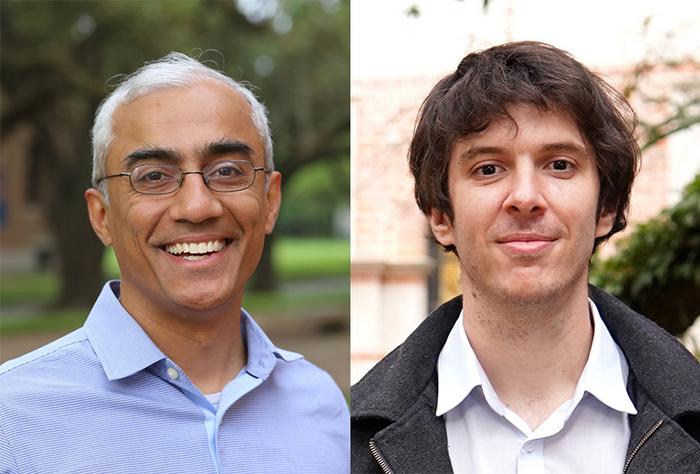HOUSTON – (Nov. 20, 2023) – Picture a swarm of drones capturing photos and video as they survey an area: What would enable them to process the data collected in the most rapid and effective manner possible?

Credit: Photo courtesy of Rice University
HOUSTON – (Nov. 20, 2023) – Picture a swarm of drones capturing photos and video as they survey an area: What would enable them to process the data collected in the most rapid and effective manner possible?
Rice University’s Santiago Segarra and Ashutosh Sabharwal have won a grant from the Army Research Office, a directorate of the U.S. Army Combat Capabilities Development Command Army Research Laboratory, to develop a machine learning framework that improves military communication networks’ decision-making processes. The research could also help inform applications such as self-driving vehicles and cyber intrusion detection.
“Distributed decision-making is crucial in military networks,” said Sabharwal, who is a co-investigator on the grant. “In high-stakes, fast-paced environments, relying solely on a centralized decision-making process can result in delays, bottlenecks and vulnerabilities. Spreading decision and execution responsibilities across the network enables a rapid response to changing situations and adaptability to unforeseen circumstances.”
The main challenge for effective distributed network control is that the individual units that make up a network — nodes — have to find the best way to aggregate local information and distill it into actionable knowledge. In the drone example, to perform a machine learning task like object recognition on visual data collected in real time, the individual nodes — or, in our example, drones — have to follow designated protocols that specify where the information is to be processed.
“This can be done either in the drone — with its limited battery and computational capacity — or can be offloaded to headquarters through wireless connections with the associated communication latency,” Segarra said.
The optimal decision depends on multiple factors, such as the size and sensitivity of the data, the complexity of the task and the congestion level of the communication network. Rigid decision-making protocols that pre-specify how information is to be aggregated can delay or impede the network’s ability to react. Sabharwal and Segarra aim to develop a novel distributed machine learning architecture that would enable nodes to combine local data in the most effective manner.
“Our goal is for the swarm of drones to make jointly optimal offloading decisions in a distributed manner — that is, in the absence of a central agent that tells every drone what to do,” Segarra said.
To achieve this, the researchers will develop a deep learning framework where two graph neural networks interact in an actor-critic setting: The actor neural network makes offloading decisions while the critic assesses their quality. By training both neural networks in an iterative fashion, the goal is to obtain a versatile actor whose decisions translate into rapid, adaptive action across a broad range of scenarios.
Segarra is an assistant professor of electrical and computer engineering and statistics. Sabharwal is Rice’s Ernest Dell Butcher Professor of Engineering and chair of the Department of Electrical and Computer Engineering.
-30-
Award information:
Project title: Distributed Machine Learning for Tactical Networks
Award number: W911NF-24-2-0008
Image downloads:
https://news-network.rice.edu/news/files/2023/11/000_AROgrant.jpg
CAPTION: Ashutosh Sabharwal (left) and Santiago Segarra
(Credit: Photo courtesy of Rice University)
Links:
George R. Brown School of Engineering: https://engineering.rice.edu/
Department of Electrical and Computer Engineering: https://eceweb.rice.edu/
Ashutosh Sabharwal website: http://ashu.rice.edu/
Santiago Segarra website: http://segarra.rice.edu/
National Security Research Accelerator: https://runsra.rice.edu/
Wireless Open-Access Research Platform: http://warpproject.org/trac
Reconfigurable Eco-system for Next-generation End-to-end Wireless: https://renew-wireless.org/
Scalable Health Labs: http://sh.rice.edu/
See Below the Skin: http://www.seebelowtheskin.org/
Saving Lives Through Transformative Health Technologies: https://pathsup.org/



